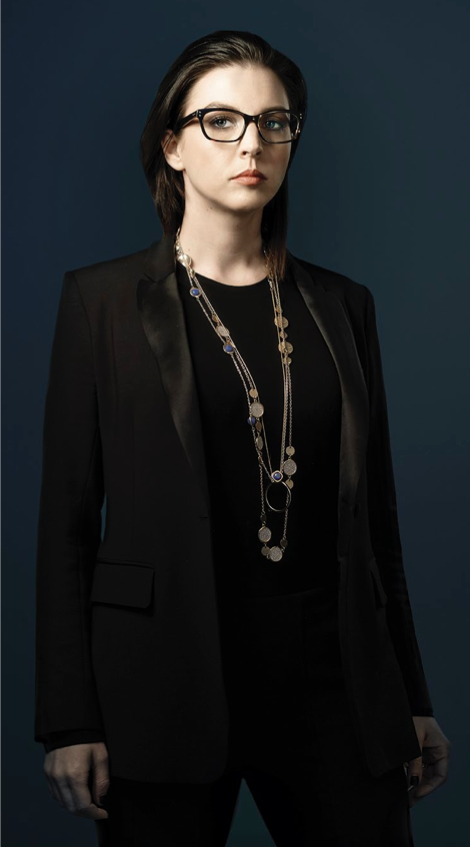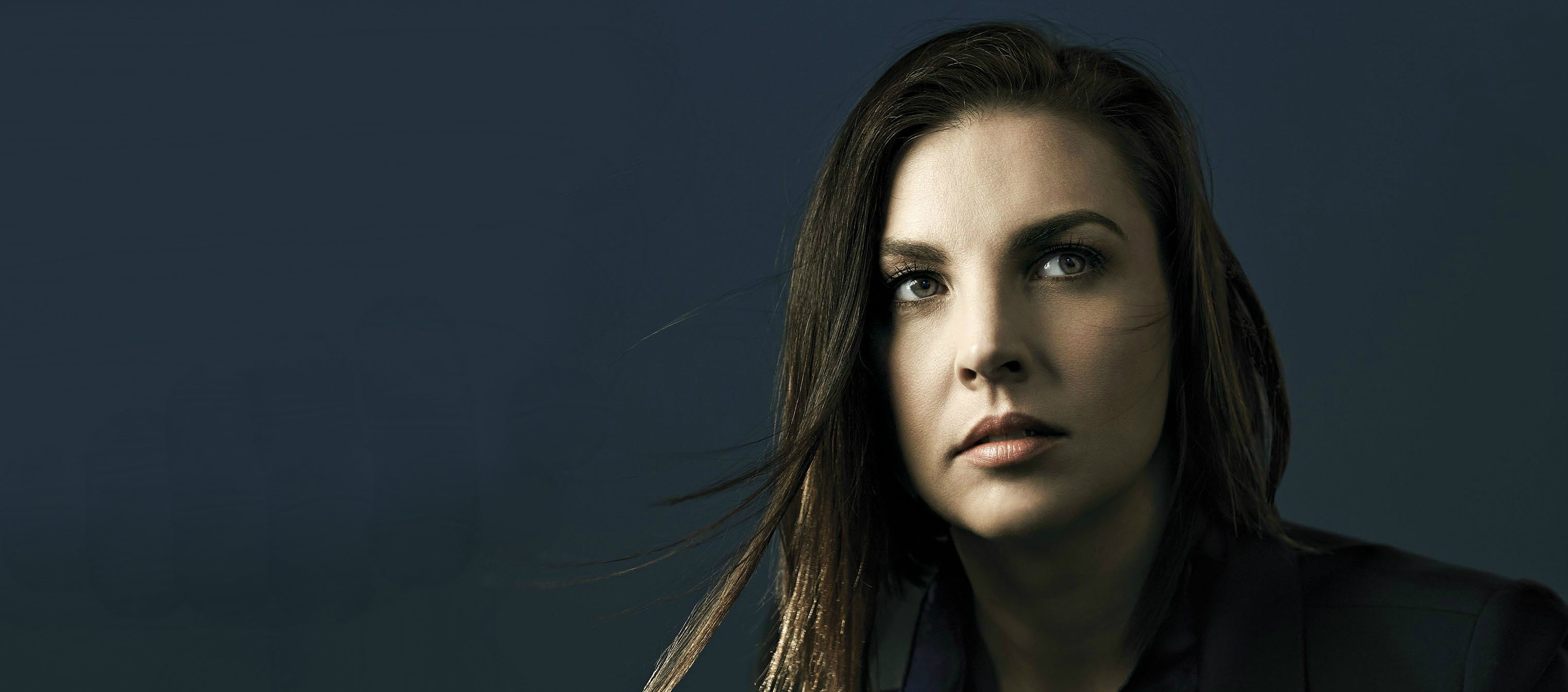In her mind, Danielle Robitaille has already pivoted to the next case. The 35-year-old criminal lawyer tells me this on a cold March morning, four days after the verdict came down in the sexual-assault trial of ex-CBC star Jian Ghomeshi. Robitaille, alongside Marie Henein, who hired her as a first-year associate almost a decade ago, trounced the prosecution and won Ghomeshi an acquittal on all five counts. We’ve met for breakfast at The Senator, a greasy spoon a few blocks from Yonge-Dundas Square. Robitaille looks well-rested and is unfailingly friendly. Clasping a cup of coffee, she explains she never has time to revel in courtroom triumphs. “It’s like being a doctor,” she says. “Once you’re done with one patient, you have to walk right back out into the waiting room.”
At the time of our breakfast, though, she was still treating the same patient, with Ghomeshi set to stand trial once more for another sexual-assault charge. And, once again, Ghomeshi’s crack legal team would deliver: in mid-May, he signed a peace bond, promising a year of good behaviour, and in return the Crown dropped the charge. Both wins on the Ghomeshi file, of course, largely belong to Henein, his lead defence lawyer. But it would be a mistake to see Robitaille as merely Henein’s sidekick.
“In most of my practice, I carry my own files,” she says. And it’s been this way for about four years, meaning her days as a green associate are long over. Officially, in fact: in 2014, as a sixth-year lawyer, she became the third partner at Henein Hutchison LLP. Looking back, Robitaille finds it funny that when she first met Henein, and asked for a job, Henein said no.

“I didn’t leave Marie’s side for five years,” says Danielle Robitaille, of her intense training under Marie Henein
Robitaille was once a rudderless law student. Halfway through her degree, at Dalhousie University, she had no long-term career goal. Then Robitaille heard about the school’s criminal-law program, which lets third-year students spend a chunk of second semester shadowing a Crown or a criminal lawyer at Nova Scotia Legal Aid. Thinking it looked fun, she signed up.
Robitaille was paired with Brad Sarson, a veteran criminal lawyer. “He was a decent man, deeply committed to his clients,” she says, dipping a hunk of toast into the yolks of her over-easy eggs. He was just as impressed with her. “Danielle had exceptional people skills,” recalls Sarson. “The fact that she did so well dealing with legal-aid clients—most of whom have substance-abuse or mental-health issues, or both—is a testament to that.”
Meeting with those clients was, for Robitaille, life-changing. “They were all just terrified,” she remembers. “Most had never stepped foot in a courtroom and, all of a sudden, they were social pariahs. After that experience, I had to be a criminal lawyer. I was a goner.”
Robitaille, however, couldn’t act on this epiphany yet. At the time, in her third year, she was already set to article in Toronto at Cassels Brock & Blackwell LLP, a large corporate firm. Then she had a stroke of luck: Cassels sometimes sent a few articling students to Eddie Greenspan’s criminal firm on a four-month secondment. Robitaille asked to get one of the placements, and did. “But Eddie wasn’t hiring that year,” she recalls, taking a sip of coffee. Meanwhile, she had pulled her name out of the hireback pool at Cassels. “So by the end of it, I still had no prospects and $100,000 of debt.”
Determined to work in criminal law, she asked colleagues for advice. “Everyone at Eddie’s said, ‘You need to meet with Marie. She’s the best lawyer we’ve ever seen.’ That was my first stop.”
It was late 2006 and Henein, who herself had worked with and learned from Greenspan, had been running her own firm for four years. Henein agreed to meet Robitaille. “I think she was skeptical of me because I’d articled on Bay Street,” says Robitaille. “I think she thought I wasn’t serious.” And when Robitaille asked for a job, Henein said she didn’t have an opening.
But Robitaille was stubborn. “I asked every partner at Eddie’s and at Cassels to call Marie and beg her to hire me,” she recalls, laughing at herself. “It quickly turned into a campaign of harassment.”
Henein remembers it well. “I was inundated with calls,” she says. “And they all said, ‘You would be just crazy to pass her up.’” Henein decided to make a position for Robitaille, but first made sure she’d have enough work for a new associate. Within three weeks, she made the job offer.
Then began Robitaille’s training under Henein. “I didn’t leave Marie’s side for five years,” she says. “There wasn’t a phone call she would make where I wasn’t sitting there staring at her.” Henein was demanding, but gave meticulous feedback. “I once wrote a factum for an appeal, and butchered it,” recalls Robitaille, laughing at the memory. “Marie tore it apart. But then she showed me, step-by-step, how she writes a factum. It was so much time and dedication.” Henein could be quite nurturing. In a profession in which young lawyers are often treated as “nameless juniors,” adds Robitaille, “Marie does the complete opposite.”
As a third-year associate, Robitaille had twins (a boy and a girl) with her husband, Mark, a historian and an editor at the Dictionary of Canadian Biography. Finding a way to parent while working late nights and weekends never worried her. “I didn’t think about it,” she tells me, after swallowing a mouthful of potatoes. “Maybe it’s because I have a working-class background.” Robitaille grew up in Kanata, her mother a nurse and her father a construction worker. “I never saw my dad any morning of my life. He was at the construction site by 6 a.m. And that didn’t damage me. I knew he cared. So I never thought I needed to be at home morning, noon and night.”
Robitaille took a one-year maternity leave, and then returned to Henein’s side for three more years. Then, in 2014, she made partner. “It’s almost as important as picking a spouse,” says Scott Hutchison, the firm’s second named partner. “You’re binding yourself to someone, financially and by reputation. But with Danielle it was easy.”
“It was shocking and flattering,” recalls Robitaille, grinning broadly. “And pretty badass.” And she’s lived up to the promotion. In the past two years, she’s made headlines for leading several cases. Most prominently, she successfully defended a police officer charged with sexual assault, and secured a retrial for a man convicted of sexual assault by arguing that he is a “sexsomniac” who committed the act in his sleep and, therefore, should not be held criminally responsible. Henein is proud of how far Robitaille has come. “This is an emotionally exhausting area of law,” she says. “But Danielle doesn’t collapse under the weight of things. She’s a very strong woman.”
So what lies ahead? “In 15 years, she will be one of the profession’s superstars,” says Rob Centa, the managing partner of Paliare Roland LLP, a top litigation boutique. (Once her mentor, he now regularly calls Robitaille for advice on criminal files.) To Centa, her place in the Greenspan-Henein-Robitaille lineage cements her future. “When we look back, it will all make perfect sense.”
Near the end of our breakfast, I ask Robitaille if she wants to become, like Greenspan and Henein, a legal icon. She laughs in my face. “That’s very cute,” she replies, setting down her glass of orange juice. “I just want to do a really great job for my clients, but not because I want to be some sort of titan.” Does she have a take, though, on the media attention or the profession’s speculation about her future? “All this shit’s collateral.”
Timeline of a young criminal lawyer
1998: At 18, Robitaille accepts that she will never be a professional ballerina. “I practised after school for years, but still wasn’t good enough.”
1999: Robitaille moves to Toronto from Kanata, to pursue a degree in political science at the University of Toronto, where she meets Mark, her future husband.
2003: She starts law school at Dalhousie University, catching the criminal law bug in third year.
2006: Robitaille articles at Cassels Brock & Blackwell LLP and spends four months of her term at Eddie Greenspan’s firm on a secondment.
2007: Marie Henein hires her as a first-year associate.
2008: Robitaille works with Henein on the high-profile trial of David Frost, a hockey coach charged with sexual exploitation. After the trial (they won), she decides to get pregnant. “I wanted one big trial under my belt before I took maternity leave.” A year later, she gives birth to twins.
2014: Robitaille makes partner at Henein Hutchison LLP.
2016: Robitaille and Henein win the Jian Ghomeshi sexual-assault trial. They also draw the ire of some critics for their deep-dyed cross examination of the complainants. Robitaille is unfazed. “If they were aware of the relevant facts and the relevant law, I could convince them that they’re wrong and I’m right.”
This story is from our Summer 2016 Issue.
Photography by Lorella Zanetti.


